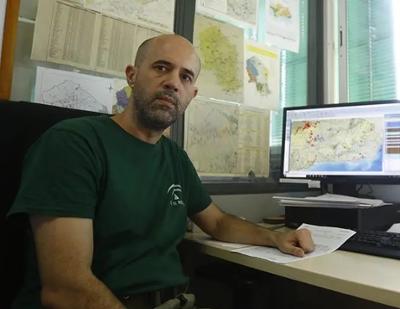

César Vicente Fernández: Andalusia boasts cutting-edge system for responding to new types of fires
Andalusia has a cutting-edge unit in place for responding to the new types of fire we are seeing that are increasingly virulent, destructive and prolonged in time. We speak with César Vicente Fernández, Technical Director of the Regional Government of Andalusia’s Regional Operational Centre, Infoca. He explains how new prevention and action measures are necessary in the fight against fire and how all the different resources are coordinated effectively.
How have fires changed in different areas and environments in recent years?
Climate change has really intensified the development of fires. This new scenario influences the frequency and numbers of forest fires and especially in terms of their intensity and severity, with the resulting risk to the population, infrastructure and ecosystems. This, together with the alteration of rainfall cycles, increases the likelihood of large forest fires. We are therefore facing a new pattern of increasingly virulent, destructive and protracted fires.
What new measures are needed in the fight against these new fires?
Among others, reinforcing the fire-fighting services with more and better resources, and strengthening the coordination of the different emergency operations. The former was carried out thanks to the budget of 257 million euros that the Andalusian Government allocates to EMA Infoca, which represents an increase of over 90 million euros compared to 2018.
Investments aimed at promoting the much-needed modernisation process have been allocated to the construction or adaptation of new infrastructures (€54 million), the renewal of 75% of the fleet of fire engines with €24.6 million of investment, the replacement of all-terrain vehicles for personnel transport with an allocation of €20 million, and the staff stabilisation agreement reached with the trade unions, which is currently being finalised and which will enable workers to be employed 365 days a year.
How will applications be managed?
In terms of coordination, the new Andalusian Emergency Agency (EMA) has been in place since 1 June. This is a strategic and essential decision for the safety of Andalusians and those who visit us any time of year. This is an important decision, based on and supported by the increasingly dangerous situation in which we find ourselves as a result of global warming, especially evident in the Mediterranean area, together with irregular rainfall, leading to high water stress in the forest mass, increasing the frequency and magnitude of virulent wildfires. The agency is made up of the Andalusian Emergency Service 112, Civil Protection, the Andalusian Emergency Group, the Institute of Emergencies and Public Safety (IESPA), and the Infoca Plan. We coordinate all the necessary resources to respond to a large-scale fire, with the shared objective of saving people's lives and, as far as possible, material and forest assets.
It is also essential to promote and encourage forest fire risk prevention and preparedness. These are primary strategic lines for the Infoca Plan, which is creating a new structure or functional Area of Prevention and Self-Protection specifically for this risk. It is essential that the forest landscape maintains adequate vegetation loads and this can only be achieved by encouraging the primary activities (livestock and forest management) that have shaped our landscape for millennia. It is also important that citizens acquire a culture of self-protection against fire.
What resources does the region currently have in place to fight these fires?
Andalusia boasts a state-of-the-art system to respond to these new fires. In broad terms, the firefighting system includes 4,700 professionals, 40 aircraft, 119 heavy extinguishing vehicles and numerous infrastructures such as Forest Defence Centres, aerodromes, fixed surveillance points and water collection points strategically located in different places to provide greater protection for our rich forest heritage, more than 4.5 million hectares.
What preventive actions should be strengthened?
For the Regional Government of Andalusia, that preventive role is very important. Of the €257 million euro budget for 2025, we have ringfenced some €146 million euros (56.80%) for preventive work. This investment must be complemented by sustainable forest management, which will enable the population to settle in these areas by contributing to their earnings from the production of products like cork, wood, honey, etc. The abandonment of the rural world has caused traditional crops - the vegetable gardens and fields we all once knew - to become fuel consumed by fires, putting at risk the populations once protected by these cultivated areas, as they acted as firebreaks. Citizen collaboration is also extremely important; residents must maintain responsible attitudes in the mountains and alert Infoca of any emergency via 112.





